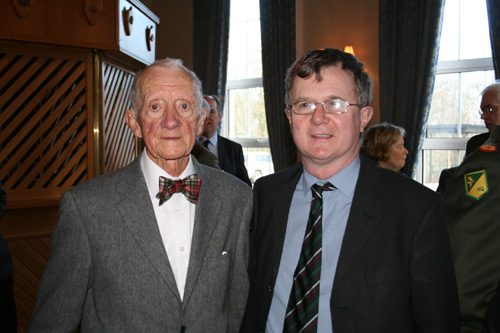Major Conference Marks Centenary of Curragh Mutiny
Posted on: 24 March 2014
Did officers behind the Curragh Mutiny actually break the law? This and other military and legal issues were debated by scholars and legal experts at a special conference organised by Trinity College Dublin and held in Ceannt Officers Mess, Curragh Camp, to mark the centenary of the Curragh Mutiny.
The Curragh Mutiny of March 20th 1914 took place in the Curragh Camp, then the main base for the British Army in Ireland. The crisis hinged on how to deal with Unionist opposition to the Home Rule Bill which was shortly to come into law, with many officers threatening to resign rather than obey orders to engage in military action against the Ulster Volunteers. The matter was resolved through a humiliating climbdown by the British cabinet, which claimed that there had been a misunderstanding and that there had never been any intention to use armed force to confront Ulster Unionist resistance to Home Rule. The event was a pivotal moment in Irish and British history, with the armed forces threatening to disobey the government of the day and the will of parliament.

Professor Risteard Mulcahy and Bank of Ireland Professor of Contemporary Irish History Eunan O’Halpin
Organised by Trinity’s Centre for Contemporary Irish History, in conjunction with the Defence Forces, the conference, The Curragh Mutiny in Context, heard from leading Irish and British historical authorities on the crisis. After the academic contributions, a panel of judges chaired by retired Chief Justice Ronan Keane heard barristers Roger Sweetman SC and Professor Eoin O’Dell, Associate Professor in Law at Trinity, debate the question of whether any laws were broken in 1914. Sir Richard Aikens of the Court of Appeal of England and Wales argued particularly strongly that there was a clear case for prosecution for sedition rather than mutiny, whereas Mr Justice Donal O’Donnell of the Supreme Court was not convinced that any offence against the law had occurred.
The conference, which was held on Friday, March 21st, 2014, marked the centenary of the Curragh Mutiny, and also the ninetieth anniversary of the Free State army mutiny of March 1924. Amongst the audience were former taoiseach Liam Cosgrave and Professor Risteard Mulcahy, whose fathers were respectively President of the Executive Council and Minister for Defence in 1924. Professor Eda Sagarra of Trinity, whose father Kevin O’Sheil played a prominent role in the political side of the independence movement, was also present. George Fergusson, governor of Bermuda, whose grandfather Sir Charles Fergusson commanded the 5th Division at the Curragh in 1914, spoke briefly on his family’s links to the crisis.
Speaking about the event, Bank of Ireland Professor of Contemporary Irish History Eunan O’Halpin commented: “The crisis hinged on the question of deploying the army to maintain order if Home Rule was applied to Ulster. But it had wider ramifications. If generals could pick and choose which government decisions and laws passed by parliament the army should obey, then the entire fabric of the British constitution would be torn to shreds.”
“The supine response of the Asquith government to the army’s challenge to its authority in March 1914 meant that these issues were never teased out, and that the mutiny was largely forgotten in the grand narrative of 20th century British history, where mutinies such as that of the Connaught Rangers in India in 1920, and of elements of the Royal Navy at Invergordon in 1931, were explained away in terms of discontent in the ranks rather than of higher political manipulation.”
Presentations at the conference included:
- Professor Eunan O’Halpin, Trinity College Dublin, Dublin Castle and the Curragh Crisis
- Tom Bartlett, University of Aberdeen, The Army and Ireland Since 1801
- Professor Ronan Fanning, University College Dublin, The Government and Ireland, 1911-14
- Professor Ian Beckett, University of Kent, Armed Services, Government and Crown in 1914
- Tim Bowman, University of Kent, Ulster Unionists and the Army
- Professor Keith Jeffery, Queens University, Belfast, Sir Henry Wilson and the Defence of Ulster
The event forms part of Trinity’s Decade of Commemoration programme.
Media Coverage:
- Irish Times, Saturday, March 22nd, Curragh Mutiny had disastrous effect on discipline in the British Army
- RTE Radio 1, Friday, Morning Ireland, March 21st, 2014
- Irish Times, Friday, March 21st, 2014, Curragh mutiny to be debated in centenary week
Media Contact:
Fiona Tyrrell, Press Officer for the Faculty of Arts, Humanities and Social Sciences, Trinity College Dublin | tyrrellf@tcd.ie | + 353 1 8964337 | + 353 87 6169056
